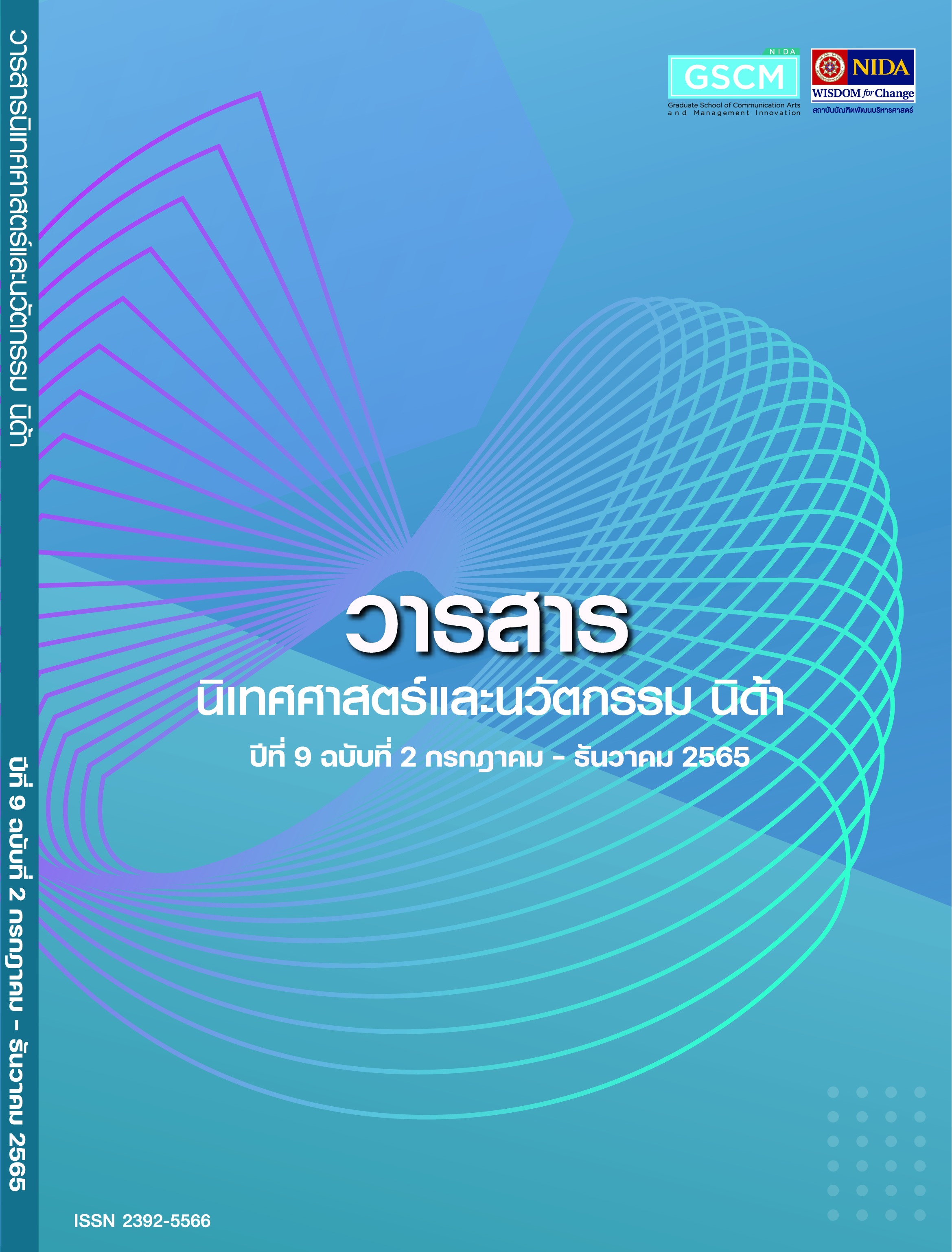Business Model of Beauty Products in the Digital Era Under Good Governance
Main Article Content
Abstract
The research aimed to 1) study the external conditions of beauty-product businesses in the digital era, 2) examine the ethics of beauty-product businesses in the digital era, and 3) develop a model for beauty-product businesses in the digital era under good governance.
The study is qualitative research, conducted by documentary analysis, i.e., documents, websites from information sources, and key entrepreneurs’ websites; and in-depth interviews with entrepreneurs of beauty-product businesses in the digital era, dealers of beauty-product businesses in the digital era, and experts in the beauty business in the digital era and marketing communication.
The findings showed that after the decline of the image of online beauty-product businesses in 2018 causing no trust in the businesses and product quality, and the pandemic of Covid-19 crisis, there were beauty-product businesses with one of the four business models that can still be operated up to now: 1) branding orientation, 2) distribution orientation, 3) distribution through the dealership orientation and 4) investment orientation. All of these models are connected and interdependent, while entrepreneurs can adjust their model by their facing business conditions. Codes of ethics in business operations are latent strategies in each component of all four business models since they are crucial factors enabling businesses to survive and transcend changes in external business conditions.
Article Details

This work is licensed under a Creative Commons Attribution-NonCommercial-NoDerivatives 4.0 International License.
ข้อความและความเห็นในวารสารนิเทศศาสตร์และนวัตกรรม นิด้า เป็นของผู้เขียนแต่ละท่าน มิใช่ของคณะนิเทศศาสตร์และนวัตกรรมการจัดการ สถาบันบัณฑิตพัฒนบริหารศาสตร์
References
จินตนา บุญบงการ. (2544). การจัดการเชิงกลยุทธ์. กรุงเทพฯ: ซีเอ็ดยูเคชั่น
ชนิกานต์ โห้ไทย. (2563). การชำระเงินดิจิทัล...ทางเลือกหลักของคนไทยในยามวิกฤต Covid-19. สืบค้นจาก https://www.bot.or.th/Thai/ResearchAndPublications/DocLib_/Article_8Mar2021.pdf
ชัยสิทธิ์ อนุชิตวรวงศ์ และอติเดช พงศ์หว่าน. (2563). Green Recovery เส้นทางและโอกาสสู่การเติบโตที่ยั่งยืน. สืบค้นจาก https://krungthai.com/Download/economyresources/EconomyResourcesDownload_620Research_Note_10_11_63.pdf
เชือด “กาละแมร์” รีวิวอาหารเสริม โอ้อวดเกินจริง กินแล้วเหนียงหาย จมูกเข้ารูป. (2564, 18 มกราคม). มติชนออนไลน์. สืบค้นจาก https://www.matichon.co.th/local/quality-life/news_2534774
ตวงพร สิงห์โต. (2564). งานศึกษาสถานการณ์และรูปแบบการนำการค้าออนไลน์มาใช้ในวิสาหกิจขนาดย่อมและขนาดย่อยของประเทศไทย. สืบค้นจาก https://www.sme.go.th/upload/mod_download/download-20210329184540.pdf
ธันยวิช วิเชียรพันธ์. (2557). สื่อดิจิทัลกับการดำรงชีวิต. กรุงเทพฯ: วังอักษร.
นันฑริกา เครือสา. (2563). พฤติกรรมการซื้อสินค้าและปัจจัยส่วนประสมทางการตลาดที่ส่งผลต่อการตัดสินใจซื้อผลิตภัณฑ์ดูแลผิวแบรนด์ เดอ ลีฟ ของลูกค้าในกรุงเทพมหานคร. ในการประชุมนำเสนอผลงานวิจัยระดับบัณฑิตศึกษา ครั้งที่ 15 ปีการศึกษา 2563, หน้า 206-220.
เนตร์พัณณา ยาวิราช. (2552). ภาวะผู้นำและผู้นำเชิงกลยุทธ์ (พิมพ์ครั้งที่ 7). กรุงเทพฯ: ทริปเพิ้ลกรุ๊ป.
บรรจง รัตนเลิศ. (2555). จรรยาบรรณในการขาย (Ethics in selling). สืบค้นจาก http://e-learning.etech.ac.th/learninghtml/7697/11_01_00.html
รัชนีกร ตรีสมุทรกุล. (2558). นวัตกรรมโมเดลธุรกิจอุตสาหกรรรมผลิตภัณฑ์สมุนไพรบรรเทาปวด (วิทยานิพนธ์ปริญญามหาบัณฑิต). มหาวิทยาลัยธรรมศาสตร์, กรุงเทพมหานคร.
วรรณเพ็ญ มูลสุวรรณ. (2559). การขาดจริยธรรมในการดำเนินงานขององค์การธุรกิจ. วารสารรัชต์ภาคย์, 10(19), 23-34.
วิทวัส ดิษยะศริน สัตยารักษ์. (2556). การพัฒนาแนวทางปฏิบัติด้านจริยธรรมของนักธุรกิจในจังหวัดสงชลา (วิทยานิพนธ์ดุษฎีบัณฑิต). มหาวิทยาลัยหาดใหญ่, สงขลา.
วิลาสินี สงวนวงษ์. (2557). การรับรู้ข่าวสารการตลาดและการตัดสินใจซื้อเครื่องสำอางของคนรุ่นใหม่เพศหญิงผ่านกูรูความงาม (วิทยานิพนธ์ปริญญามหาบัณฑิต). สถาบันบัณฑิตพัฒนบริหารศาสตร์, กรุงเทพมหานคร.
วีระยุทธ รัชตเวชกุล (2563). จริยธรรมในการดำเนินธุรกิจชุมชนของกลุ่มผลิตภัณฑ์ผ้าและเครื่องแต่งกายที่ได้รับการรับรองคุณภาพผลิตภัณฑ์ชุมชนในจังหวัดขอนแก่น. วารสารมนุษยศาสตร์และสังคมศาสตร์ มหาวิทยาลัยนครพนม, 10(1), 92-100.
ศักดิ์ดา ศิริภัทรโสภณ. (2559). ศักยภาพในการแข่งขันและความพร้อมของวิสาหกิจขนาดกลางและขนาดย่อมของไทยในการเข้าสู่ประชาคมเศรษฐกิจอาเซียน. วารสารสมาคมนักวิจัย, 21(1), 9-33.
ศุภนารี พิรส, และธรรศนวัตร์ ไชยเยชน์. (2565). จริยธรรมทางธุรกิจที่ส่งผลต่อผลการดำเนินงานของผู้ประกอบการธุรกิจขนาดกลางและขนาดย่อยเจนเนอเรชั่นเอ็กซ์และเจนเนอเรชั่นวายในจังหวัดพิษณุโลก. วารสารวิทยาการจัดการมหาวิทยาลัยราชภัฏพิบูลสงคราม, 4(1), 1-17.
สุภางค์ จันทวานิช. (2545). การวิเคราะห์ข้อมูลในการวิจัยเชิงคุณภาพ. กรุงเทพฯ: สำนักพิมพ์แห่งจุฬาลงกรณ์มหาวิทยาลัย.
เสรี วงษ์มณฑา. (2547). ครบเครื่องเรื่องการสื่อสารการตลาด. กรุงเทพฯ: ธรรมสาร.
หรรษมน เพ็งหมาน (2559). จริยธรรมทางธุรกิจเพื่อความยั่งยืนของธุรกิจค้าปลีก. Veridian E-Journal, Silpakorn University ฉบับภาษาไทย สาขามนุษยศาสตร์ สังคมศาสตร์ และศิลปะ, 9(1), 815-828.
อภิรัฐ ตั้งกระจ่าง และบัณฑิต ผังนิรันดร์. (2546). จริยธรรมทางธุรกิจ. กรุงเทพฯ: ธรรมสาร.
อมลณัฐ พวงชาวนา และคณะ. (2558). ปัจจัยทางการตลาดที่มีผลต่อการตัดสินใจเลือกซื้อผลิตภัณฑ์เครื่องสำอางในเขตกรุงเทพมหานคร. RSU Journal, 16(1), 153-162.
อุไรพร ชลสิรุ่งสกุล. (2554). Digital Marketing ไอเดียลัดปฏิวัติการตลาด. กรุงเทพฯ: กรุงเทพธุรกิจ.
Baghdadi, Y. (2013). From e-commerce to social commerce: A framework to guide enabling cloud computing. Journal of Theoretical and Applied Electronic Commerce Research, 8(3), 12–38.
Euromonitor International. (2022). Consumer Health in Thailand: October 2022. Retrieved from https://www.euromonitor.com/consumer-health-in-thailand/report.
Hajli, M. (2012). A research framework for social commerce adoption. Information Management & Computer Security, 21(3), 144–154.
Han, Y. & Hong, S. (2019). The impact of accountability on organizational performance in the U.S. federal government: The moderating role of autonomy. Review of Public Personnel Administration, 39(1), 3-23.
McMurrian, R. C., & Matulich, E. (2006). Building customer value and profitability with business ethics. Journal of Business & Economics Research (JBER), 4(11). https://doi.org/10.19030/jber.v4i11.2710
Nalisa (2564). ตลาดความงาม: ยุคที่คนต้องใส่หน้ากาก แต่หยุดสวยไม่ได้จริงๆ. สืบค้นจาก (https://marketeeronline.co/archives/212053
Ogbari et al. (2016). Entrepreneurship and business ethics: Implications on corporate performance. International Journal of Economics and Financial Issues, 6(3), 50-28.
Osterwalder, A. & Pigneur, Y. (2014). Business model canvas. Hoboken, New Jersey: Wiley.
The Standard Team. (2561). สรุปกรณี เมจิก สกิน ใช้คนดังสร้างความเชื่อ อวดอ้างเกินจริง สร้างความเสียหายกว่า 100 ล้านบาท. สืบค้นจาก https://thestandard.co/conclude-magic-skin/)
Turban, E., Strauss, J. and Lai, L. (2015). Social commerce marketing, technology and management. New York: Springer.


